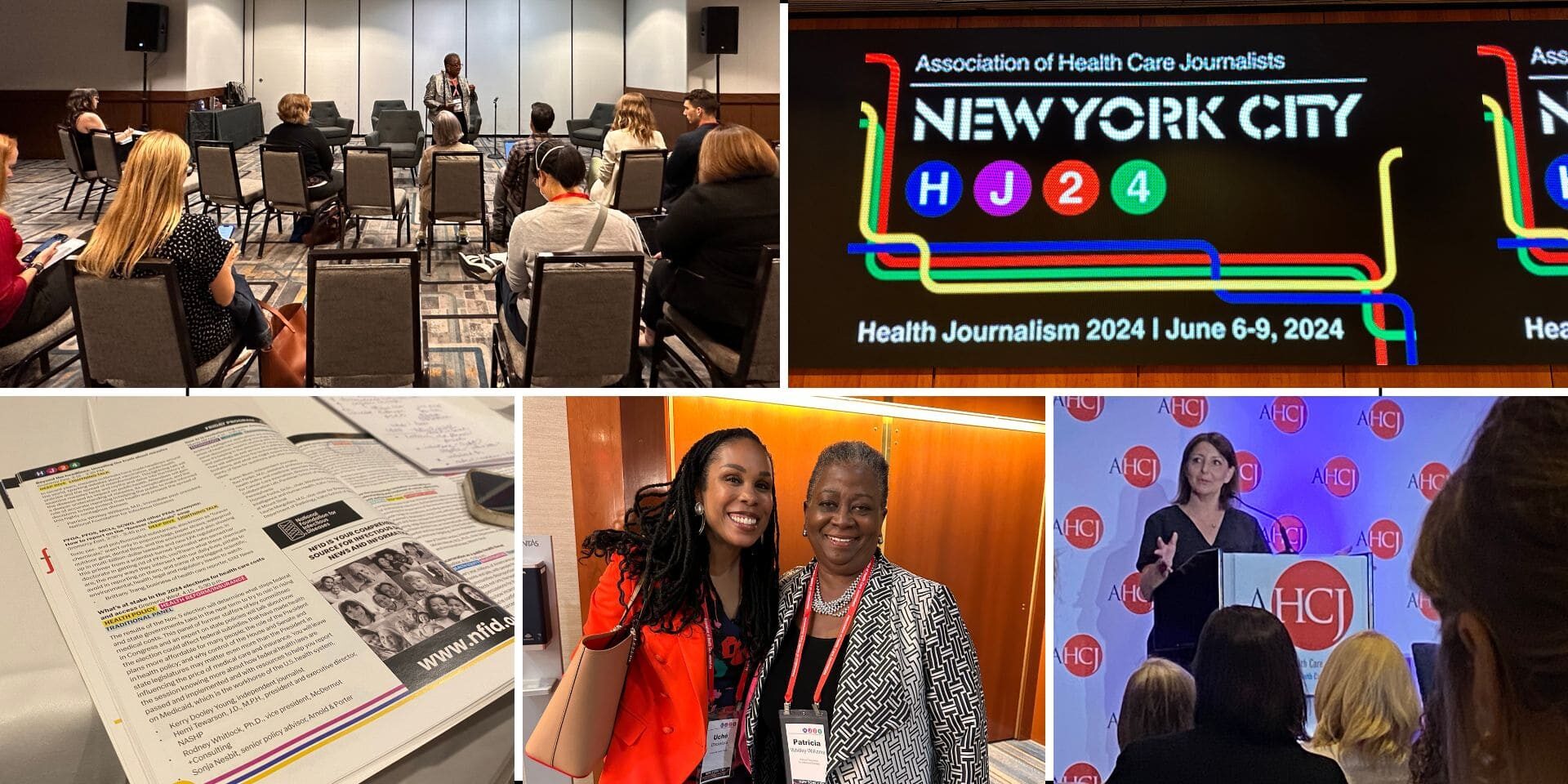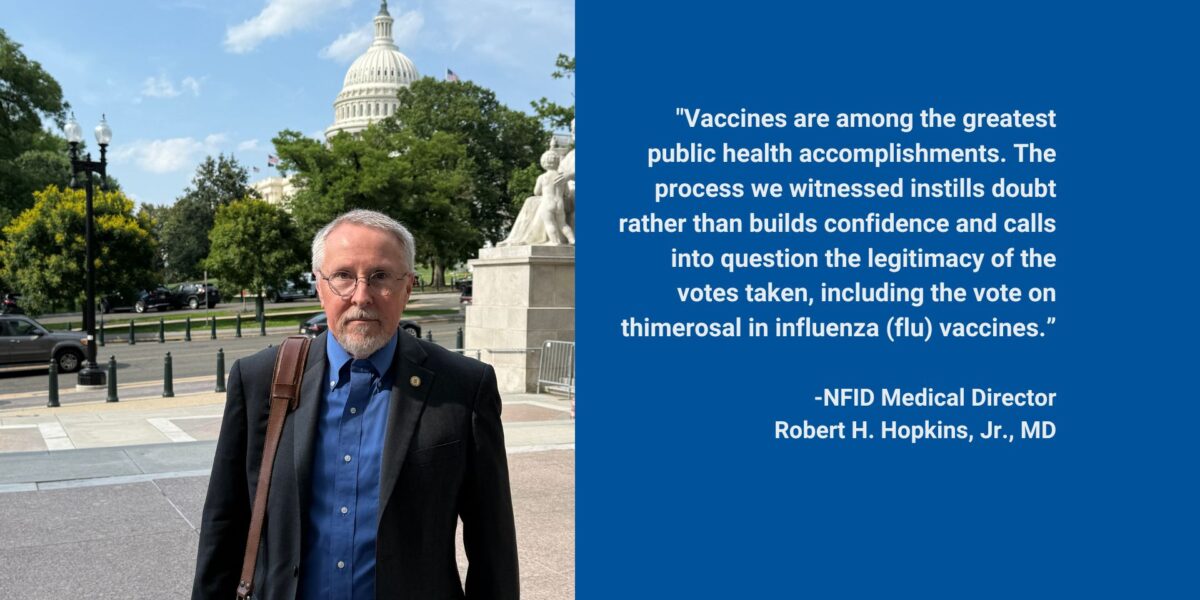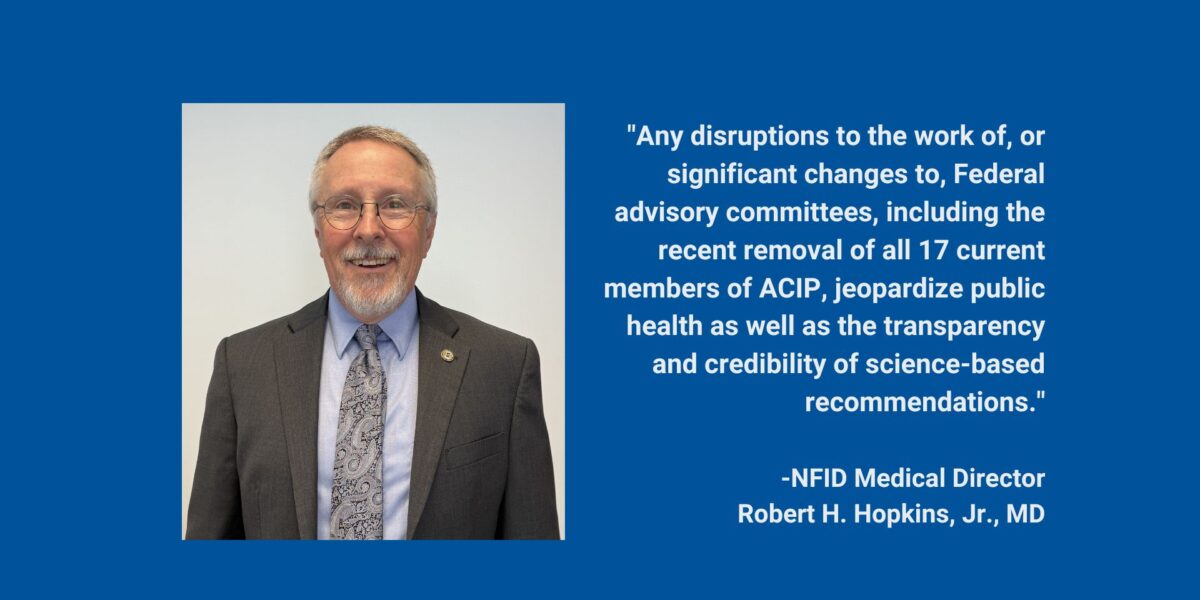
The National Foundation for Infectious Diseases (NFID) recently joined hundreds of journalists and other healthcare organizations for Health Journalism 2024, the annual conference of the Association of Health Care Journalists (AHCJ) on June 6-9, 2024 in New York City.
NFID Immediate Past-President Patricia N. Whitley-Williams, MD, presented a lightning talk, “Beyond the Headlines: Unveiling the Truth about Measles,” in which she explored the facts and myths about measles and the role of accurate reporting in helping the public make informed decisions to help protect their health and prevent the spread of this highly contagious disease. In a session on “Restoring Confidence in Public Health,” Mandy K. Cohen, MD, MPH, director of the Centers for Disease Control and Prevention (CDC), emphasized that members of the media play a key role on “team health” because of their ability to tell compelling stories and explain complex medical information in ways that resonate with audiences.
We need to be winning hearts, not just minds. The media can help us win hearts and minds as we do this work together.
-CDC Director Mandy K. Cohen, MD, MPH
Healthcare professionals and public health experts can help advance public understanding of healthcare issues by working with journalists to improve the quality and accuracy of health journalism. Read on for 5 reasons to engage with the media:
1. Enhance Public Understanding
Public health recommendations can be complex, with medical terminology and concepts that can be daunting for the public. Healthcare journalists excel at distilling this information into clear, understandable narratives. By engaging with members of the media, healthcare professionals, researchers, and public health experts can help ensure that their findings and recommendations are accurately conveyed. Well-informed journalists can help combat misinformation and disinformation, providing the public with reliable information to help guide behavior and decision-making.
2. Put a Human Face on Public Health Recommendations
Vaccine policy and other public health recommendations are based on data and science, but data alone cannot change minds or influence behaviors. People often underestimate the potential severity of vaccine-preventable diseases such as measles or influenza (flu). Journalists can help bring to light compelling stories of people who have been impacted by infectious diseases, as well as sharing the perspectives of healthcare professionals who care for them.
3. Build Trust and Credibility
With trust in many institutions waning, the credibility that a respected journalist or trusted influencer can bring is invaluable. They can act as impartial observers who can validate the statements made by healthcare professionals and researchers, lending added legitimacy to the information. By proactively engaging with journalists, subject matter experts can contribute to the narrative, fostering better coverage that is accurate and reflects nuanced medical science.
4. Promote Health Literacy
Health literacy involves the ability of individuals to obtain, process, and understand health information needed to make appropriate health decisions. Journalists can contribute to health literacy by translating scientific research into plain language and practical advice. Engaging with the media enables health experts to reach a broader audience, breaking down barriers to understanding and enabling people to make informed decisions about their health.
5. Encourage a 2-Way Dialogue
Engaging with the media should be a 2-way dialogue in which both parties learn from each other. Journalists gain insights into the latest medical research, public health recommendations, and clinical practices, while health experts can better understand public concerns and questions that need answering. This exchange has the potential to enrich both fields, leading to more informed journalism and more responsive health communications.
The media play a vital role in getting the word out so that people have accurate information and are empowered to make good decisions to help protect their health.
– NFID Immediate Past-President Patricia N. Whitley-Williams, MD
Resources to Help Improve Healthcare Coverage
NFID offers media resources, including subject matter experts, press releases, and news conferences, to help journalists improve their coverage of infectious diseases
Contagious Chronicles, a new NFID audio series, features timely insights from NFID experts providing relevant context and clear explanations on topics in the news, including bird flu, measles, norovirus, and other infectious diseases
The NFID podcast, Infectious IDeas, features thought-provoking conversations with public health leaders and experts, including newsmakers and leading healthcare journalists
To join the conversation and get the latest news on infectious diseases, follow NFID on X (Twitter), like us on Facebook, follow us on Instagram, visit us on LinkedIn, listen and subscribe to the Infectious IDeas podcast, and subscribe to receive future NFID Updates.
Related Posts

Flawed ACIP Process Leads to Confusion and Distrust
Public health experts and leading healthcare professionals share concerns regarding the June 2025 Advisory Committee on Immunization Practices (ACIP) meeting on US immunization policy …

Empowering Men to Prioritize Health
Staying up to date on all recommended vaccines and taking other steps to prevent illness helps ensure men are ready for what matters most—showing up for loved ones or simply enjoying life …

Experts Sound Alarm after ACIP Members Removed
Public health experts and leading healthcare professionals share concerns on the removal of all 17 members of the Advisory Committee on Immunization Practices (ACIP), which advises the Centers for Disease Control and Prevention (CDC) on the use of vaccines in the US
